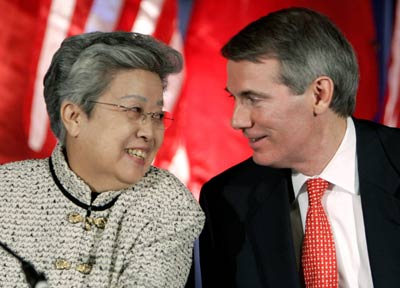Major deals
Vice-Premier Wu Yi said last week that major commercial deals China has
signed with the United States reflect its sincerity to reduce the huge trade
surplus.

Chinese Vice
Premier Wu Yi (L) and US Trade Representative Rob Portman speak at a news
conference following the annual meeting of US-China Joint Comission on
Commerce and Trade in Washington April 11, 2006.
[Reuters]
|
Wu, who heads a 200-strong
delegation of business people in Washington, told a press conference that
Chinese companies had signed 107 contracts with US firms worth US$16.2 billion.
The agreements cover sectors ranging from airplanes, electronics, car parts,
heavy equipment and software to cotton and soybeans.
Bribery crackdown
The Ministry of Health last week appointed a team to lead the national
crackdown on commercial bribery in the health sector. The team, headed by Health
Minister Gao Qiang, will implement the guidelines and policies set by the
Communist Party of China Central Committee and the State Council in the
crackdown throughout the health system.
It will also liaise with other government departments in prosecuting cases of
corruption, the ministry said.
Whistle-blower's hotline, mail address and the health minister's e-mail
address have been made public on the ministry website. In China, some companies
and individuals offered commissions to health officials and staff to secure
contracts for substandard drugs and medical equipment, resulting in many medical
accidents.
Bilateral trade
China's bilateral trade totalled US$371.3 billion from January to March, an
increase of 25.8 per cent from the same period a year ago, the Ministry of
Commerce said last week.
Exports stood at US$197.3 billion in the past three months, up 26.6 per cent
year-on-year; imports hit US$174 billion, up 24.8 per cent.
Trade surplus mounted to US$23.3 billion, up 41.4 per cent year-on-year. Last
year, China's trade surplus more than tripled from 2004, totalling US$101.9
billion.
Overseas investments
The China Insurance Regulatory Commission said last week the State Council
has approved plans to let insurers buy foreign currency with their own
yuan-denominated funds to invest overseas as the government tries to widen
investment channels and boost returns on investment.
Commission Chairman Wu Dingfu said a pilot scheme would be launched in the
first half of this year. The regulator will choose one or two insurance
companies to start the pilot scheme and give approval case by case due to the
risks involved, he said.
Chinese insurers, which have more than quadrupled their
assets in the past five years to 1.6 trillion yuan (US$200 billion), have long
been hampered by a lack of investment channels at home.
(For more biz stories, please visit Industry Updates)